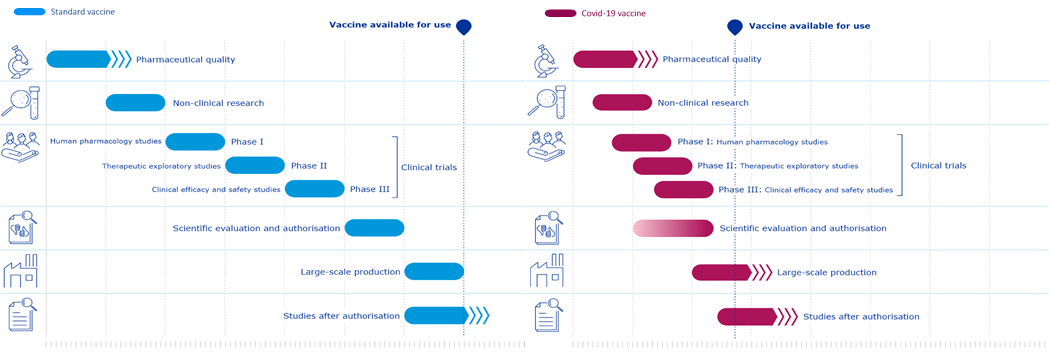Why anti vaxxers are right
Titles can be tricky! Before discussing the main argument of this article, I would like to point out how very often articles’ titles try to catch your attention by stating a controversial phrase. It’s up to your reading and understanding to figure out the real message behind that article which could counterpose the title itself.
A somewhat recent trend, now under the spotlights more than ever, is the gathering of large
groups of individuals under a common controversial ideology that clashes with centuries if
not even millennials of knowledge and studies, as for example the Flat Hearth Society or
anti-vax movements.
Let's take the latter and analyse it in the most recent context where opinions and ideas
sprouting from such groups on the matters of covid-19 and the new Pfizer/BioNTech vaccine
have surely made the news. Anti-vaxxers back up and spread their belief about the unsafety,
risks and dangers of vaccines as they seem to have identified more cons than pros in their
utilization. The hypothesis related to sars cov-2 vaccinations, now becoming a rather strong
belief, is that since the trials and development were rushed under the current
circumstances (Figure 1 explains how standard vaccine developments are conducted and show that
the developlements for the covid-19 vaccine has not been rushed, but done at the same time of
other phases), these vaccines could contain harmful substances which have the
potential to
modify our genetic code.

Such ideas are often deeply rooted in the individuals that carry them and are hard to
eradicate or even simply put up to discussion. On a
Science
Friday
podcast discussing the anti-vaccination movement, a guest, who believed vaccines were
natively bad for our health, was asked to state how much proof they needed in order to
believe these were actually safe. The guest replied saying that no experts or amount of
evidence could have ever changed their mind on this subject.
Experts in these matters, scientists and researchers often try to explain the complex
mechanisms and functionments of vaccines in clear and simple terminology in order to
disprove such theories by providing evidence and proofs; despite this, totally incorrect and
unfunded views still persist.
So the question is: why there are people who cannot stand to scientific evidences and keep
falling in the rabbit hole of conspiracy theories?
The answer actually is quite simple: it’s all in our brain. In fact, our brain has several
mechanisms that keep us hold tight to our beliefs. This does not happen because we are
stubborn, as Shannon Odell (neuroscience
PhD)
explains:
“
The human brain is wired to see patterns to help us survive. Sensing patterns can save your life. Pattern processing became increasingly sophisticated with expansion of the cerebral cortex, particularly the prefrontal cortex and regions involved in image processing.” However, this survival mechanism can end up running wild. “As we evolved, the brain got so good at finding patterns that it sometimes sees a pattern in completely unconnected data.
”
Our brain uses various cognitive biases, that are systematic errors in the way we think
about the reality. For example, a very much used bias is the availability bias which is the
tendency to recall the information you can remember better, even if it’s wrong or it’s a
non-rational decision.
One form of more complex cognitive bias is cognitive dissonance. When an individual holds
two or more cognitions which are inconsistent with one another, for example “vaccines are
safe” and “vaccines change your genetic code”, they feel a state of dissonance, which can be
reduced in different ways, for example: they can avoid the element that causes dissonance,
which is the one that isn’t in harmony with his beliefs, or they can highlight positive
aspects of the chosen option and negative aspects of the rejected one.
Cognitive dissonance also happens when a person's behavior doesn’t align with their beliefs.
In this case, they can hide their behaviors or beliefs from other people or change their own
in accordance with each other.
The confirmation bias is another type of bias, which explains why people keep believing in
their opinion even when presented with evidence and facts that clearly prove them incorrect.
In fact, people have the tendency to ignore information that goes against their beliefs and
instead prefer to promote information that supports them.
These are only two of the several psychological mechanisms that affect the ways individuals
can choose whether or not to follow experts’ evidence and public health guidelines.
The uncertain times we live in could actually be the root cause of the boom in conspiracy
theories and unjustified beliefs. The increase in the adoption of social media has helped
people surround themselves with nearly only the information that already agree with their
beliefs. Moreover, despite having the possibility to be fully informed thanks to the
numerous online sources which would allow for self-analysis, verification and comparisons,
these seem to be mostly ignored by those individuals who widespread the topics discussed
above and make them part of their core beliefs.
Concluding, despite the somewhat absurd claims you may hear and the large growing movements
that aim to spread incorrect information, not all is due to misinformation and lack of a
scientific process in the analysis of the encountered information, but some mistakes may
also be due to our human nature and the way our brains work.
